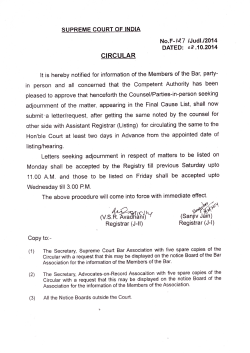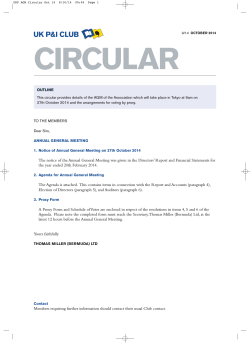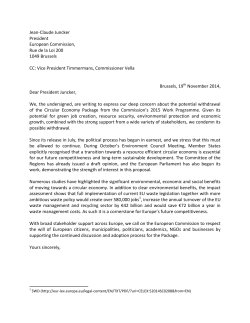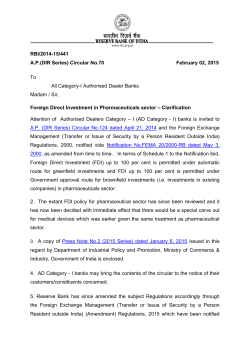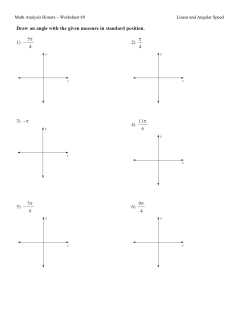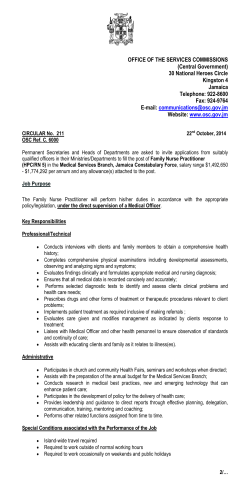
RE-THINKING PROGRES S SCHEDULE
RE-THINKING PROGRESS SCHEDULE RE:CENTRE UNIVERSITY OF BRADFORD 14-15 APRIL 2015 Global Partners of the Ellen MacArthur Foundation 14 - 15 APRIL 2015 RE-THINKING PROGRESS Now in its second year, Re-thinking Progress is the Ellen MacArthur Foundation’s open-house event held at the University of Bradford, UK. It is aimed at participants looking to build knowledge in the circular economy in both higher education and business contexts, or looking to network in an informal setting. The event takes place across two days with a ‘pick-and-mix’ schedule of seminar sessions, workshops and networking opportunities. On the evening of the 14th April, we will host the annual Re-thinking Progress lecture in the Norcroft Auditorium. Changing Paradigms: Business and the Circular Economy Norcroft Auditorium, 18.30 - 19.30, Tuesday 14th April Pia Heidenmark Cook - IKEA Ellen MacArthur - Ellen MacArthur Foundation Gavin Warner - Unilever This panel discussion will focus on two key global businesses and their experiences in initiating a change management programme for the circular economy. The panelists will discuss the challenges and opportunities this presents and take questions from the audience. 14 APRIL PLANNER RE-THINKING PROGRESS RE:CENTRE FOYER NORCROFT AUDITORIUM SEMINAR SPACE 11.00 11.15 Circular Economy Fast Track Jules Hayward and Colin Webster 11.45 12.15 TEACHING SPACE 11.00 - 12.00 11.30 12.00 SHARED SPACE 12.00 onwards 12.00 - 13.30 Registration Lunch 12.30 (Food served until 1.00pm) 12.45 13.00 13.15 13.30 13.45 14.00 14.15 14.30 14.45 15.00 15.15 15.30 15.20 - 15.50 15.45 Break 16.00 15.15 16.30 13.30 - 14.20 13.30 - 14.20 13.30 - 14.20 Business Model Innovation for a Circular Economy The Biorefinery at DSM Dr. Markus Zils Whole System Design Cards for Business Thinking in CE Barry Waddilove 14.30 - 15.20 14.30 - 15.20 Feed>back. From a Systems Perspective Which Flows Really Count? Ken Webster Bugaboo: making the wheel more circular 15.50 - 16.40 15.50 - 17.50 15.50 - 16.40 The Business Case for Circular Economy Principles, Guidelines, Tools: The Designer in the Circular Economy Circular Business Opps. for the Built Environment Dr. Ellen Franconi and Marissa Yao (WebEx) Dr. Markus Zils 16.45 16.50 - 17.50 17.00 17.15 17.30 17.45 18.00 18.15 17.50 - 18.20 Break 18.30 18.30 - 19.30 18.45 Changing Paradigms: Business and the Circular Economy Pia Heidenmark Cook, Ellen MacArthur & Gavin Warner 19.00 19.15 19.30 19.30 onwards Drinks reception Marcel Wubbolts (WebEx) Aernout Dijkstra-Hellinga Clare Brass, Dr. Fiona Charnley and Dr. Renee Wever 16.50 - 17.50 Collaborative Networks & the Circular Economy Circular Economy and Remanufacturing Prof. David Romero Dr. Nabil Nasr (WebEx) 15 APRIL PLANNER RE-THINKING PROGRESS RE:CENTRE FOYER 9.00 SEMINAR SPACE SHARED SPACE TEACHING SPACE 12.25 - 13.15 12.25 - 13.15 A New Pan-University Learning Model at Cranfield University Cradle to Cradle® Powering the Circular Economy 9.00 - 11.00 New Higher Education Curriculum Development Toolkit 9.15 Jules Hayward, Craig Johnson and Jo Miller 9.30 9.45 10.00 10.15 10.30 10.45 11.00 11.15 11.30 11.45 11.00 - 11.15 Break 11.15 - 12.15 The Circular Economy Story Prof. Peter Hopkinson 12.00 12.15 12.30 12.45 Lorraine Bell and Dr. Fiona Charnley 13.00 13.15 13.30 13.45 14.00 14.15 14.30 13.15 - 14.15 Lunch Katja Hansen 14 APRIL SESSION SUMMARIES RE-THINKING PROGRESS 11.00 - 12.00 13.30 - 14.20 14.30 - 15.20 Circular Economy Fast Track Whole System Design Cards for Business Thinking in a Circular Economy Feed>back. From a Systems Perspective Which Flows Really Count? Barry Waddilove The key to a circular economy is effective flows and enhancing capital. Jules Hayward and Colin Webster This session is aimed at people who are new to the circular economy framework and would like to develop an understanding of the core principles. It might also interest individuals who are designing their own formats for a short fast track session. The session will cover the overarching framework as explored by the Ellen MacArthur Foundation, case studies of emerging trends in both small and large businesses and examples of progress in teaching and learning. 13.30 - 14.20 Business Model Innovation for a Circular Economy This session will demonstrate an innovation card game. The game helps companies to explain and evaluate their existing business system and then to identify opportunities for transition to new circular economy business models. A Whole System Design approach is used to understand the interrelatedness of both problems and solutions when developing sustainable initiatives. The methodology enables participants to understand the relative importance of flows in resource, including materials and energy, and supports the identification of a company’s value network by key stakeholders in order to understand how the business might change as maintenance, re-use, remanufacture and recycling are investigated. What’s in and what’s out? Does it matter? Ken Webster A big picture tour of the boundaries we choose or ignore in the search for a framework for thinking, and how this relates to questions of growth, employment, education and more... 14.30 - 15.20 Bugaboo: making the wheel more circular Aernout Dijkstra-Hellinga Dr. Markus Zils The library of case examples on successful circular economy model innovation is fast growing. Many companies and entrepreneurs are exploring new avenues to take active part in this transition. In this workshop, we will have a deeper look at the underlying circular value creation levers and the required business model innovation to capture and redistribute the created value along new chains and cycles. The objective is to jointly shed some light on the inner workings of these models. It will be a journey to the dark-side of the moon of our linear economic model and to explore new ideas to accelerate the transition towards a circular economy, which is poised to deliver attractive rewards to first movers! 13.30 - 14.20 In this workshop, Aernout will explain the current thinking at Bugaboo about becoming more responsible, sustainable and circular. The Biorefinery at DSM Marcel Wubbolts via WebEx The sun provides (in theory) enough energy and raw materials to make and recycle all atoms and molecules back to their original state. We need to learn to make the shift from a linear approach to a circular one. There are significant opportunities for DSM in renewable energies such as cellulosic-, plant-residue-based bioethanol, as well as in renewable building blocks replacing oil-based chemicals that would enable us to build the materials of the future designed to live in closed loops. Bugaboo International is a Dutch design company that develops and produces mobility products. Bugaboo is known for its innovative and breakthrough design of strollers. Bugaboo began as a small start-up in 1999 and grew rapidly over the next ten years to become a global player; its products are now available in more than 50 countries. As a company that has innovation at its core, Bugaboo feels the passion and obligation to explore different ways of doing business and different ways of solving the customers’ needs. In an interactive setting, Aernout hopes to get feedback and insight from attendees to make sure that Bugaboo’s wheels become even more circular. 14 APRIL SESSION SUMMARIES RE-THINKING PROGRESS 15.50 - 16.40 15.50 - 17.50 16.50 - 17.50 The Business Case for a Circular Economy Principles, Guidelines, Tools: the designer in the circular economy Collaborative Networks & the Circular Economy Prof. David Romero Dr. Markus Zils The linear take-make-dispose economy has been a success story in driving efficiency and wealth creation for large parts of the global population. As this model comes under stress from multiple angles the circular economy model, which is restorative by design, aims to offer attractive avenues to continue to boost wealth creation while taking economic source and sink constraints into account. This transition from a linear to a circular economy has the potential to unlock additional value. To capture this value profound shifts need to be initiated, which will challenge the so far very successful status quo. In this workshop we will jointly examine the forces at work for delivering superior value in a circular economy and discuss current mega-trends supporting the adoption of this new economic paradigm. Clare Brass, Dr. Fiona Charnley, Dr. Renee Weaver and Ken Webster The circular economy promises a world of opportunities for designers. However, it also comes with challenges, including the recognition and understanding of a new context where the role of the designer and rules of the game are changing. Is there a need to identify an appropriate set of new design principles? This workshop will use some existing and putative design guidelines to prompt deeper discussion and reflection. Please note that there is a small amount (approximately 15 minutes) of pre-workshop stimulus reading material for this workshop, which will be emailed to you by 1 April 2015. 15.50 - 16.40 Circular Business Opportunities for the Built Environment 16.50 - 17.50 Dr. Ellen Franconi via WebEx Circular Economy and Remanufacturing Buildings contribute to a substantial portion of global energy use along with its associated carbon emissions. Buildings also comprise an attractive investment opportunity for improvements in their design, energy-using products, and operation. This webinar introduces the concepts examined and case studies illustrated in the buildings chapter for Volume 2 of A New Dynamic – Effective Business in a Circular Economy (EMF, in press). A simple framework is used to consider the basis underlying existing business models for the built environment. Through a progression of steps over the product lifespan, a course to create continued value is proposed to improve circularity. Three case studies are featured to examine the approach and potential for success. Prof. Nabil Nasr via WebEx There is strong evidence that transitioning to a circular economy can lead to higher economic growth while reducing the impact on the environment. Extending product life through repair, refurbishment, and remanufacturing offer significant economical and environmental advantages. Remanufacturing specifically offers substantial and verifiable benefits to rising global issues of resource efficiency, circular economy, environmental protection, and social equity. This presentation will highlight a circular model incorporating a remanufacturing strategy. The model will illustrate the challenges and opportunities of a circular model and the necessary elements to implement such a model. This lecture explores the potential synergies between Industrial Ecology and Collaborative Networks scientific disciplines for supporting a sustainable transition towards a Circular Economy. The lecture will introduce a toolkit in development to enable integrated solutions at both intra- and inter-enterprise levels for lowering resources input, enhancing resources productivity, reducing wastes and emissions, and lowering operating costs within an enterprise and between industrial networks based-on Sustainable Collaborative Networked Organisations models. The toolkit includes a Reference Framework, a Maturity Model, and a Systems of Systems Engineering Approach. 18.30 - 19.30 Changing Paradigms - Business and the Circular Economy Pia Heidenmark Cook, Ellen MacArthur and Gavin Warner This panel discussion will focus on key challenges and opportunities organisations face when aligning circular innovation with core business strategy. Ellen MacArthur shares the stage with Unilever and Ikea to discuss their collective experience as catalysts of transformation from linear to circular. 15 APRIL SESSION SUMMARIES RE-THINKING PROGRESS 9.00 - 11.00 12.25 - 13.15 New Higher Education Curriculum Development Toolkit A New Pan-University Learning Model at Cranfield University Jules Hayward, Craig Johnson and Jo Miller with Pioneer University colleagues Lorraine Bell and Dr. Fiona Charnley Working with key academic contacts, the Ellen MacArthur Foundation is developing a Higher Education (HE) Curriculum Development Toolkit, which aims to provide guidance, resources, recommendations, insights and relevant links to support HE institutions (including private research organisations) that look to develop circular economy teaching and learning capacity. It will be a living resource updated by the Foundation and our HE partners annually. This session will be the first time the toolkit is shared publicly in a draft format. The team will work to both showcase it in its current state and capture feedback from interested parties who attend, including HE colleagues and industry representatives. This feedback will then inform the development of the next version for our Summer School in June 2015. For higher education to reflect innovative practice, holistic thinking and the changing economy, postgraduate courses need to be developed with the flexibility to adapt to the needs of industry, organisational challenges and the changing lifestyles of learners, incorporating flexible working and digital technologies. This interactive session introduces the development of a new PanUniversity learning model that is being developed at Cranfield University for the delivery of an executive masters in Technology and Management for a Circular Economy. The session will encourage participation surrounding the uses of technologyenhanced learning to facilitate personal, cross disciplinary, reflective and applied educational journeys. 12.25 - 13.15 11.15 - 12.15 Cradle to Cradle® Powering the Circular Economy The Circular Economy Story Katja Hansen Prof. Peter Hopkinson In this session Peter Hopkinson will lead a discussion about the circular economy as a new story for the 21st century. We are all familiar with stories and the powerful messages they can convey. In this session Peter will provide some prompts and activities to examine the language and framing of the circular economy and say a little about his thinking and ‘internal’ story over the past 5 years of working with the Ellen MacArthur Foundation. He hopes that participants will join him in an open conversation to discuss why we are each drawn towards the circular economy framework, personal and professional struggles in your own journeys and how language, metaphor, frames and narratives are important influences shaping our thinking and communication. A carpet that cleans the air, an air duct you can wash, a conveyor belt that saves 50% of operating energy by changing the materials, a system which purifies water by feeding fish, a building site that generates profits as an energy company. How did designers arrive at those profitable, innovative, performance-enhancing products and systems? Welcome to Cradle to Cradle®; an innovation framework whose material cycles are acknowledged as the basis for material flows in the circular economy. In this session we will explore the Cradle to Cradle® framework for improving the quality of products, systems and services. It generates positive impacts by designing economic, social and environmental benefits into materials, products, buildings, neighbourhoods and regions. SPEAKER BIOGRAPHIES RE-THINKING PROGRESS Lorraine Bell Lorraine is the Head of Technology Enhanced Learning (TEL) at Cranfield University. She has worked across IT, learning content development and design and learning development at Cranfield University. Lorraine is currently enhancing the TEL strategy and advises senior members of the University on the digital learning trends in education. Lorraine works closely with academic staff across the schools on the Cranfield campus to design and develop appropriate learning materials to use across the programme portfolio. She leads the Digital Leaders Network, which is a group of academics and professional staff who meet to discuss, innovate and enable others in the use of digital delivery to enhance the teaching and learning experience. Lorraine’s interests are in the personalisation of learning and the variety of learning styles. Clare Brass As Head of the Royal College of Art’s new cross-departmental centre for sustainability, SustainRCA, Clare works with creatives, entrepreneurs, designers, engineers and business, to support the creation of positive social and environmental futures. As a product and industrial designer, she was Leader of Sustainability at the UK’s Design Council before setting up a social enterprise - the SEED Foundation. She is a skilled business coach and a Senior Design Tutor on the Innovation Design Engineering program at the RCA and Imperial College London. Clare and her students have been working with the Foundation on the circular economy for two years as a member of the Schmidt-MacArthur Fellowship Programme. Dr. Fiona Charnley Fiona is the Master of Design Programme Director in the Centre for Competitive Creative Design at Cranfield University. Since undertaking her PhD in Whole System Design, she has been teaching and researching in the field of design for a more sustainable, regenerative and circular economy. She has worked with multiple organisations across sectors to facilitate the implementation of systems thinking and closed loop innovation using ideas such as a Product Passport and the exploration of new models of production and consumption. Fiona leads the EPSRC Network in Re-Distributed Manufacturing, Consumer Goods and Big Data (RECODE)- a two year project to explore the use of big data in the transition towards a de-centralised and connected model of circular production. Fiona is an academic advisor on the Foundation’s Schmidt-MacArthur Fellowship programme – an international programme for postgraduate students on the circular economy. Aernout Dijkstra – Hellinga Aernout is a Senior Product Developer and Sustainability Specialist. He works closely with Max Barenbrug, co-founder of Bugaboo, pursuing a vision of developing mobility products that make a difference. Aernout studied Industrial Design Engineering at Delft University of Technology. He has previously run his own company and worked for one of the Netherlands’ largest design agencies. At Bugaboo, he leads the development of a vision for sustainable product design. He is currently focused on using Bugaboo products for multiple lifecycle uses and on improving the quantity of recyclable materials used and the durability of its products. Dr. Ellen Franconi Ellen Franconi is a Principal at the Rocky Mountain Institute (RMI) in Boulder, Colorado. Ellen holds a PhD in Building Systems Engineering and has worked in the building energy field for over 25 years. Her areas of expertise include: building performance simulation, integrated design, sector-level analysis, energy-efficiency savings verification, and risk-based engineering for improved investor confidence. At RMI, she strives to be a change agent for leveraging business-based solutions that capitalize on building energy- savings opportunities. Her current focus is buildings in China, its energy revolution, and the potential for circular business models to support it. Katja Hansen Katja Hansen implements the Cradle to Cradle® Design Framework with government agencies, NGOs and companies. She co-engineered the Carlsberg Circular Community, which was announced at the 2014 World Economic Forum, and is the largest Cradle to Cradle® supplier community with combined revenues exceeding $23 billion. With EPEA Internationale and Hamburger Umweltinstitut, she co-developed frontrunner initiatives in Latin America, Africa, and Europe on agrochemicals, nutrient recycling and natural & synthetic fibers. Katja studied biological engineering graduating in 1991. SPEAKER BIOGRAPHIES RE-THINKING PROGRESS Jules Hayward Jules Hayward manages the Ellen MacArthur Foundation’s Education and Training Team working to enable multiple connections between businesses, insight and analysis, and policy programmes. She works across training, schools and colleges, informal education and higher education. She leads the Foundation’s Pioneer and Network University programmes. Jules also works to support the development of further circular economy teaching programmes and to identify the relevant bodies of research, which are critical to accelerating the transition to a circular economy. Pia Heidenmark Cook Pia Heidenmark Cook is Head of Sustainability at the IKEA Group, Retail & Expansion. She leads a group of 25 sustainability managers across Europe, Asia Pacific and North America who are embedding sustainability in IKEAs retail operations and securing a more sustainable offer for IKEA customers. She also co-chairs, with the EU Commission, the Retailers Environmental Action Programme (REAP). Before joining IKEA in 2008, Pia worked as Vice President Corporate Social Responsibility at the Rezidor Hotel Group, and as operator of brands at Radisson SAS and Park Inn (300+ hotels in 50+ countries). During that period, Pia also chaired the tourism branch of the Prince of Wales Business Leader’s Forum - a membership organisation of all major international hotel brands. Pia has studied and worked in the fields of CSR and sustainability across academia, consultancy and business since 1996. Prof. Peter Hopkinson Peter Hopkinson is Professor of Innovation and Environmental Strategy at the University of Bradford’s School of Management. Peter is director of the academic collaboration with the Ellen MacArthur Foundation and leads the new online MBA in Innovation, Enterprise and Circular Economy, as well as the executive education course for the Global CE100. Peter is also director of the University’s Centre for the Circular Economy, based in the new £6M re:centre, a cross-university research and business engagement centre focused on innovation, enterprise and strategy around resources, materials and energy within industrial economies. Craig Johnson Craig Johnson works as an Education Programme Manager at the Ellen MacArthur Foundation. Craig works extensively on the online executive education introductory course and the Enterprise, Innovation and Circular Economy MBA at Bradford University School of Management amongst many of the other education initiatives at the Foundation. Craig graduated from the University of London with an Ecology degree and has an interest in the design of food and farming systems based on living systems principles. Craig is co-author (with Ken Webster) of Sense and Sustainability – educating for a low carbon world (Ellen MacArthur Foundation/Terra Preta, 2009). Dame Ellen MacArthur Ellen MacArthur made yachting history in 2005, when she became the fastest solo sailor to circumnavigate the globe, and remains the UK’s most successful offshore racer ever, having won the Ostar, the Route du Rhum and finished second in the Vendée Globe at just 24 years of age. Having become acutely aware of the finite nature of the resources our linear economy relies upon, she stepped away from professional sailing to launch the Ellen MacArthur Foundation in 2010, which works with education and business to accelerate the transition to a regenerative circular economy. Ellen MacArthur sits on the European Commission’s Resource Efficiency Platform, and her Foundation has published two seminal macro-economic reports featuring analysis by McKinsey, which have received accolades at the World Economic Forum in Davos. Dame Ellen regularly interacts with various European governments and institutions such as the OECD, and received the French Legion of Honour from President Nicolas Sarkozy, three years after having been knighted by Queen Elizabeth. Jo Miller Jo Miller is the Programme Manager for the Schmidt-MacArthur Fellowship. With a background in science communication Jo has been with the Ellen MacArthur Foundation since its launch in 2010, setting up and running a number of largescale programmes. As part of the higher education team Jo manages the Schmidt-MacArthur Fellowship, an international programme for postgraduate students and their academic mentors on the circular economy. She also manages the Foundation’s relationship with TU Delft and works to stimulate mutually beneficial collaborations between the Fellowship’s 14 Partner Universities and other areas of the Foundation’s work, including business, research and capacity building. SPEAKER BIOGRAPHIES RE-THINKING PROGRESS Dr. Nabil Nasr Dr. Nabil Nasr is Associate Provost for Academic Affairs and Director of the Golisano Institute for Sustainability at Rochester Institute of Technology. He has worked in the fields of sustainable production, remanufacturing, and sustainable product development for over 28 years, and is founder of the Center for Remanufacturing and Resource Recovery - a leading source of applied research and solutions in remanufacturing technologies. He has served as an expert delegate for the U.S. government in several international forums including the Asia Pacific Economic Cooperation and the World Trade Organisation, and was recently appointed as a member of the International Resource Panel of the United Nations Environment Programme. Prof. David Romero Prof. David Romero is Senior Research Scientist and Scientific Project Manager for the National Graduate School of Science and Engineering at Instituto Tecnológico de Monterrey, Mexico. He is currently acting leader of the research line on Sustainable PRocess Industry & iNdustrial ecoloGy (SPRING), within the Advanced Manufacturing Research Group at the Center for Innovation in Design and Technology. Barry Waddilove Barry is a multidisciplinary designer, who has worked with companies in over 20 countries. Currently based in Hertfordshire, he has previously lived in Hong Kong, Canada and America while working on diverse projects in product development, retail design, advertising and events management. As one of the 2014 Schmidt-MacArthur fellowship cohort, Barry recently graduated from Cranfield University with a masters in Design and Innovation for Sustainability. His research project for the Ellen MacArthur Foundation involved the design of a tool to enable organisations to think systemically, while developing projects that transition from linear to circular business models. Gavin Warner Gavin Warner is a Director of Sustainable Business at Unilever. He is responsible for driving sustainable action from Brands and Categories and for unlocking new innovation growth opportunities. He also oversees the measurement and reporting of the Unilever Environmental Footprint. Gavin leads the Unilever relationship with the Ellen MacArthur Foundation aiming to inspire circular innovations. Gavin is an experienced FMCG marketer, with a passion for brands, innovation and pioneering change. He has worked across multiple geographies and categories including tea, food and washing detergents. Colin Webster Colin Webster works as an Education Programme Manager with the Ellen MacArthur Foundation. His role includes developing educational resources for secondary schools and universities, and supporting online learning programmes. He has previously worked in youth development and as a secondary school teacher. Ken Webster Ken Webster is Head of Innovation at the Ellen MacArthur Foundation. His background is in economics education, teaching, teacher training and curriculum development. He writes extensively on the circular economy and its connections with systems thinking. He has been working at the Foundation since the end of 2009 and was a part of its establishment in 2010. SPEAKER BIOGRAPHIES RE-THINKING PROGRESS Dr. Renee Wever Renee is a tenured assistant professor in Design for Sustainability at Delft University of Technology. He teaches on topics related to the inclusion of sustainability in the design process and he is course coordinator of the MSc module ‘Strategic and Sustainable Design’ (part of the Integrated Product Design MSc program). He supervises several MSc projects related to circular product design, and was the 2014 Schmidt-MacArthur Fellowship mentor representative from TU Delft. As a member of the Foundation’s Pioneer University programme, TU Delft is engaged in a number of leading teaching and research programmes around design for the circular economy. Renee specifically collaborates to develop dedicated circular courses, including a Massive Open Online Course (MOOC). Marissa Yao As the Sustainability lead at SunPower, Marissa works on various programs ranging from Circular Economy to Life Cycle Assessments to social enterprise. Marissa is part of a team focused on obtaining Zero Waste to Landfill, Cradle to Cradle and LEED certifications for all of our panel assembly sites around the world. In addition, she oversees SunPower’s 3S (Solar Service Station) social enterprise program which provides solar rechargeable lanterns to impoverished communities. Prior to joining SunPower, Marissa spent 9 years at Intel Corporation as a member of the Corporate Environmental Group. Marissa holds a BA in Environmental Science from UC Berkeley, an MPH in Epidemiology and MEM in Industrial Environmental Management from Yale University. Marcel Wubbolts Marcel Wubbolts is Chief Technology Officer at DSM, based in Urmond, the Netherlands, and is responsible for the maintenance of existing and the development of new key technological competences that enable the company to develop new products and processes and to support and optimise existing products and processes. These competences form the backbone of DSM’s innovation capabilities. Royal DSM is a Circular Economy 100 member. Dr. Markus Zils Dr. Markus Zils is Managing Director of Returnity Partners, a firm dedicated to accelerating the transition towards a circular economy by supporting targeted research, consulting and investment projects. The objective of Returnity Partners is to support clients in identifying, initiating and implementing circular business model innovation at scale. Prior to joining Returnity Partners, Markus has worked as a senior principle at McKinsey & Company, where he contributed to the Ellen MacArthur Foundation’s Towards the Circular Economy report series. Markus holds a PhD from the University of Cologne on economic modeling and optimization of complex transportation networks, a Masters from the Community of European Management Schools from H.E.C in Paris and a masters in management science from the University of Cologne.
© Copyright 2026
